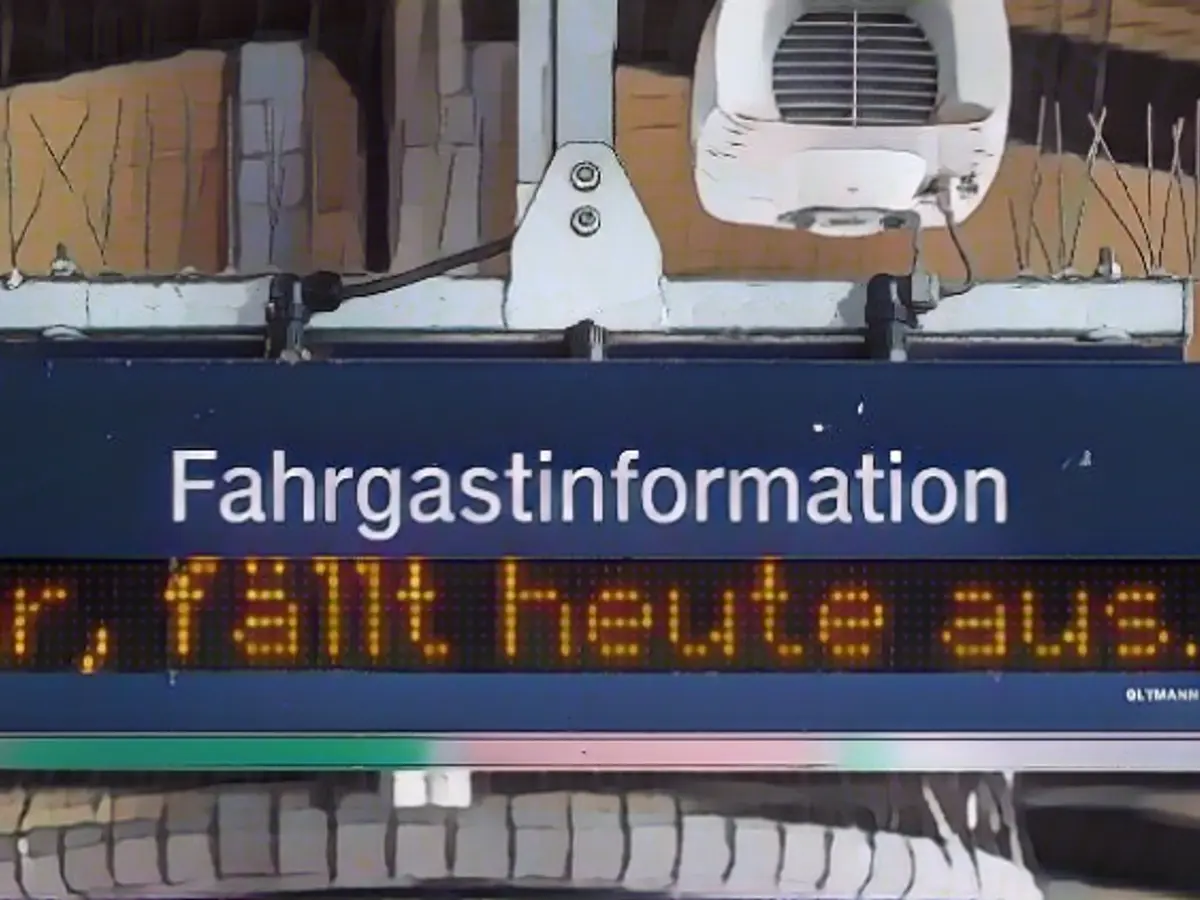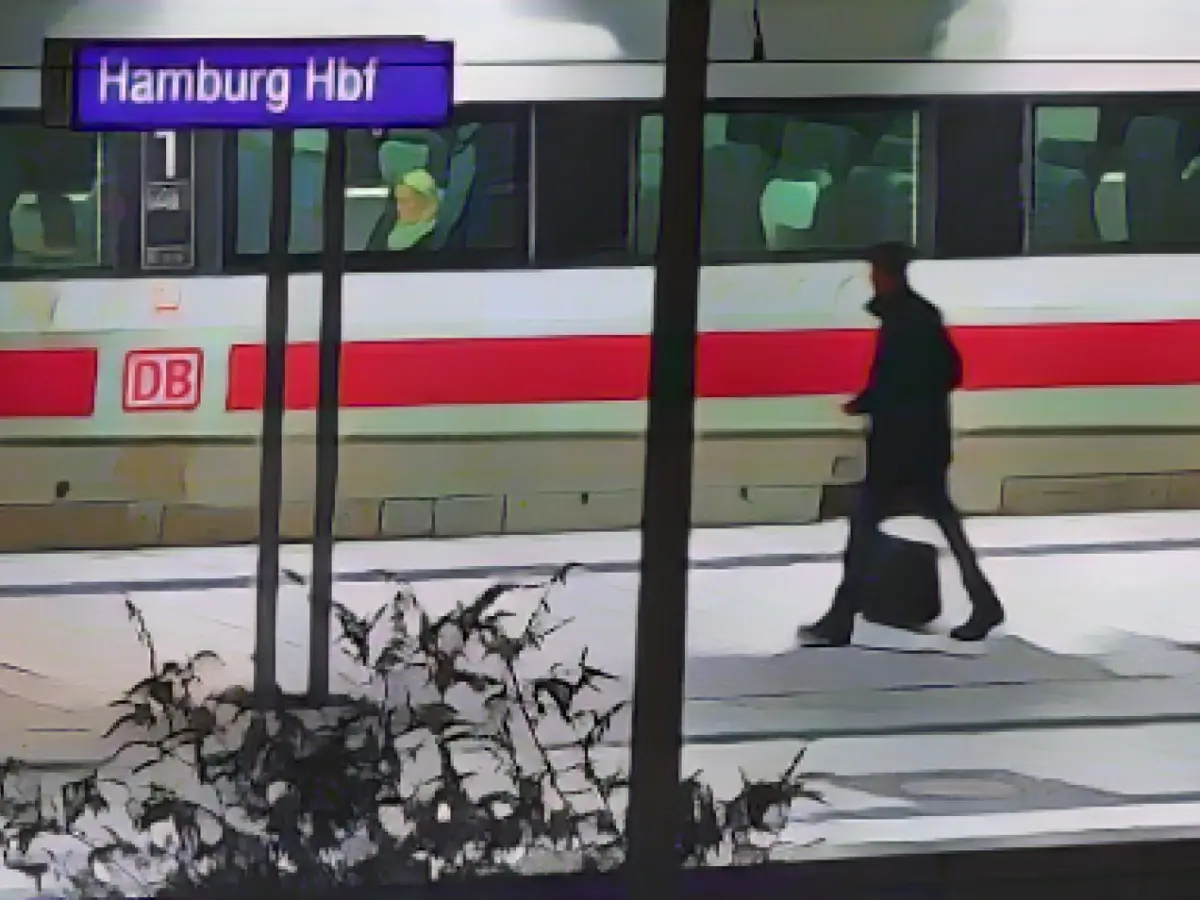Disruptive Times Ahead for Rail Travelers: GDL Strike Strikes Again
Prepare for yet another chaotic weekend in rail travel as the German Train Drivers' Union (GDL) launches another 24-hour warning strike on long-distance and regional services, starting at 6 p.m. on Thursday. This action, the second in the ongoing round of collective bargaining, expands on the initial strike that affected only rail freight services.
Rail freight services were impacted four hours earlier on Thursday. Deutsche Bahn, Germany's leading railway service, had already anticipated this and preemptively removed numerous connections from the schedule to prevent nights stops on open routes. The strike, which extended to passenger trains, will undoubtedly cause far-reaching restrictions for passengers.
Southern Germany's regional services will be significantly affected, and Deutsche Bahn anticipates that one in five long-distance trains will be operational during the strike. They will focus on starting the trains in the right locations after the end of the strike.
Working Hours and Compensation: The Heart of the Dispute
The primary point of contention between the GDL and both Deutsche Bahn and their competitor, Transdev, lies in the demand for a reduction in weekly working hours for shift workers from 38 to 35 hours, with full pay compensation. The employers have so far rejected this demand.
Deutsche Bahn criticizes the GDL's industrial action as unreasonable, particularly due to the poor timing for freight traffic, which has already been impacted by the weather conditions in Bavaria. The backlog is expected to increase during the strike, potentially leading to production line stoppages in the industry.
The revised timetable following the strike aims to minimize disruptions by adding additional trains and long-distance connections. However, the warning strike just before the timetable change adds pressure to control centers, further complicating operations.
GDL and Public Perception
GDL boss Weselsky acknowledges the inconvenience caused to passengers but defends the union's stance, stating that they have no other choice. He encourages passengers to direct their complaints to Deutsche Bahn, not the union.
The German Association of Towns and Municipalities criticized the short notice for the warning strike, calling it harmful to millions of people and the environment.
Future Outlook: What Lies Beyond the Warning Strike
Encouragingly, GDL boss Weselsky has ruled out any future industrial action up to and including January 7. However, strikes could return after that period, as Weselsky hinted at longer and more intense strikes in the new year. Up to 75 percent of those voting in a ballot might support indefinite strikes, which could lead to several days of industrial action.
The impact of such strikes on the economy is significant, particularly for industries dependent on rail transport, such as German power plants, which rely on weekly deliveries of coal, and steelworks. Delays or cancellations could disrupt their supply chains, potentially leading to shutdowns.
In conclusion, this week's warning strike by the GDL once again highlights the delicate balance between the needs of railway workers and the broader public. As tensions continue, both passengers and the industry will need to adapt and find ways to navigate the resulting disruptions.
Source:
Enrichment Data:
The recent labor disputes in the German railway industry have mostly revolved around two main issues - wage negotiations and working conditions. Here are the key points:
- Wage Demands:
- The German Railway and Transport Union (EVG) has demanded a pay raise of 7.6%, which is higher than the 6.6% offer made by Deutsche Bahn.
- The EVG also seeks more flexibility for shift workers, allowing them to convert wage increases into additional time off.
- Working Conditions:
- The EVG is pushing for a 35-hour work-week, which has been a contentious issue. Critics argue that Deutsche Bahn does not have enough engineers to support this change, even on a 40-hour schedule.
- The union also has concerns about job security and restructuring plans, particularly for DB Cargo, which could lead to inconsistencies in working conditions.
- Strike Threats:
- If negotiations fail, the risk of strikes increases significantly. The last major labor dispute in 2023 resulted in nationwide strikes that disrupted railway services for days.
- The threat of strikes became more prominent due to the upcoming federal election on February 23, 2025, adding political uncertainty to the negotiations.
- Previous Disruptions:
- The previous wage dispute with the GDL train drivers' union in 2023 led to widespread service disruptions, affecting passengers and logistics across Germany.
- The recent agreement between DB and EVG has avoided immediate strikes, but new disputes are a possibility if economic conditions change significantly before 2027.
These issues have resulted in significant disruptions in long-distance and regional services in Germany, with the potential for further disruptions if negotiations do not progress smoothly.








